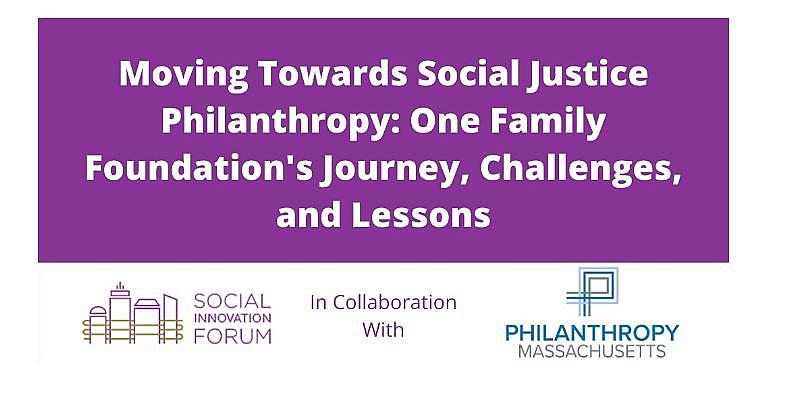
On June 30 the Social Innovation Forum (SIF), in partnership with Philanthropy Massachusetts, hosted a virtual learning session, “Moving Towards Social Justice Philanthropy: One Family Foundation’s Journey, Challenges, and Lessons,” featuring family members from the Surdna Foundation. The session was part of SIF’s expanding funder education program. The program seeks to advance learning for funders and volunteers with a focus on responding to trends in philanthropy, deepening our understanding of pressing local social issues, and ultimately strengthening relationships with leaders of mission-based organizations in order to make more effective philanthropic decisions.
What was once a program to teach the basics of philanthropic practice, shifted to teach younger generations about power and privilege, history of systemic racism, and social justice principles.
More than 130 people joined the session to hear from Kelly Nowlin, a 5th generation Andrus family member and a current member of the Surdna Foundation Board who serves on the Boards of both the National Center for Family Philanthropy and Grantmakers for Effective Organizations. Kelly also advises family foundations around the country. The Surdna Foundation had been committed to social justice for decades but only named social justice in their mission 12 years ago. Kelly shared that this “naming” had a ripple effect that was operational, cultural, and strategic. The foundation board and staff learned through challenges and failures that having a racial equity lens was not enough and they needed to put racial equity at the CENTER of all of their work. This led to changing the family philanthropy training program to align more directly with the mission. What was once a program to teach the basics of philanthropic practice, shifted to teach younger generations about power and privilege, history of systemic racism, and social justice principles.
You can find that publicly shared curriculum, the “Social Justice Toolkit,” on the Surdna Foundation website.
Kelly was joined at our session by her cousin Sam Downes. Sam is a 6th generation member of the Andrus family. Sam has been a participant and leader in both the Andrus Youth Service Program and Surdna’s Board Experiential Training Program since he was in his early teens. This past year, he served on a working group that led efforts to refine and expand Surdna’s social justice family program for all generations. This value of the training became evident when 5 of the 13 members who joined him in the training program shared that they were against the social justice focus of the foundation’s work. The family members went public with those opinions and the foundation decided to be transparent with the impact and response. Despite the tremendous difficultly navigating these differences, their willingness to be open has allowed for learning across the sector.
Members in the audience represented family foundations, corporate foundations, individual donors, and many other learners who were deeply engaged with the topic and appreciative of the transparency that the Surdna Foundation has allowed. Their questions were specific and direct with inquiries such as:
- How to avoid replicating white supremacist power dynamics in working relationships with grantees
- How to access and implement a social justice curriculum for next-gen family members
- Ways to begin discussions on racial equity with board members
- How to find examples of who is leading with racial equity in the center of their work
The session concluded with some key learnings that came from Surdna’s experience, and that Kelly and Sam hope will help other foundations as they navigate moving towards social justice philanthropy. They include:
- Boards need to do some work themselves before engaging with staff members of color and EACH individual on the board should work to expand their experience and education and look at implicit biases
- Practice! Keep trying and learning how to have conversations across differences. Surdna has hosted a virtual all family webinar about systemic racism.
- When families are struggling with these issues it’s important to find other areas for connection
- Do not avoid or be silent
- Recognize that capturing and sharing the complete history and intent of a founder is a valuable exercise that can build connection, illuminate values and demonstrate the need to evolve mission based on current social issues
- In centering racial equity, there is a need to follow up your mission with action. Some actions may include the board letting go of power in order to be more responsive to grantee needs, reconsidering who the foundation contracts with, and rethinking where convenings are held and how time is spent.
We were so appreciative that Kelly and Sam joined us and shared their learnings. For those who missed the session, you can find a starting list of resources and action that Kelly shared here. For additional information please reach out to Carolyn Shaughnessy at cshaughnessy@socialinnovationforum.org. Also, stay tuned for additional funder learning sessions with the SIF team.
 Social Innovation Forum
Social Innovation Forum